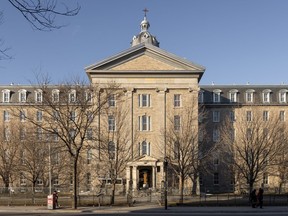Quebec calls for proposals from companies to build housing units in the old Institut des Sourdes-Muettes building on Berri St.

About 1,000 new housing units could soon be built in a building abandoned for almost a decade in the heart of the city.
The province launched a call Wednesday for proposals from companies to build housing in the old Institut des Sourdes-Muettes at 3700 Berri St., at the corner of Cherrier St. The deadline for proposals is Jan. 30, and the province hopes to announce the winning project by the spring.
The building, owned by Quebec, can house about 1,000 residential units, and the province has pledged to adhere to the city’s 20-20-20 bylaw, which reserves 20 per cent of each project for social housing, 20 per cent for affordable housing and 20 per cent for large units that can accommodate families.
“Despite the challenges, I am happy to note that the city and (province) have heeded the call to provide more housing,” Housing Minister France-Élaine Duranceau said in a statement. “The potential to densify is huge and I hope that contractors will seize this opportunity to offer Montrealers a housing project that responds to their demands.”
Once a hospital for those with hearing and speaking difficulties, the institute had occupied that spot in the city since 1864 — the original stone housing having been replaced by the actual building in 1900. The greystone building, which takes up the entire city block, was declared a protected heritage building. It was abandoned by the Sisters of Providence in 1975 and served as an administrative building for health-care workers until 2015.
Speaking to reporters Wednesday, Plateau-Mont-Royal borough mayor Luc Rabouin said it’s good news that the building will finally find a vocation to house Montrealers.
“It’s an incredible opportunity to preserve an exceptional heritage building and to create housing,” Rabouin said. “We can’t wait on this, because the longer we wait, the more the building degrades and costs more to repair.”
Rabouin said the city had presented a project to the province three years ago but was rejected. For that reason, he’s pleased that the province has elected to move forward now and has committed to creating social and affordable housing.
He added that it’s unrealistic to expect that the province will go over and above the requirements for this project because of the high cost to restore and then maintain the heritage elements of the building.
“That costs a lot of money, so we can’t have everything: restore all the heritage elements and have 100 per cent social housing,” Rabouin said. “That’s why we’re open minded to allow developers to propose something.”
But the city’s opposition doubts that any social housing will be part of an eventual project.
“In recent years, we have seen that most developers have elected just to pay the fines, rather than build social housing,” said Julien Hénault-Ratelle, the spokesperson on housing matters. “Of course, I hope for there to be social housing, but at this point I don’t have any proof that we will see social housing here, and that is something we desperately need in Montreal.”